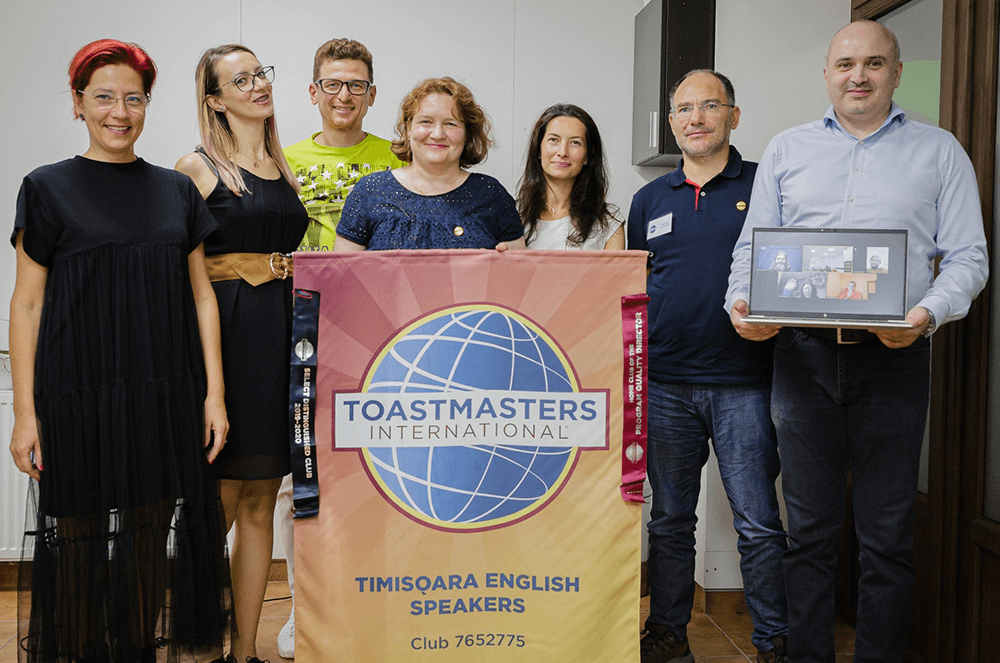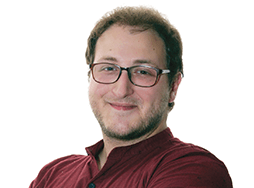
Nearly two years ago, on February 24, 2022, Russia launched a military invasion of Ukraine, the first move in a war that has since taken thousands of lives and disrupted everyday existence for many.
The Arttalkers Toastmasters club based in Kyiv, the Ukrainian capital, posted a simple message to its members on the Telegram Messenger app that day:
Dear all, taking into account the situation, no meetings for now. Please stay safe and donate money to volunteers.
At that time, Calin Gilea, DTM, was the District 110 Director. A member of the Timisoara English Speakers in western Romania, he was in the midst of visiting clubs in his District and had been pricing out flights to visit clubs in Ukraine just before the war began.
Gilea knew the importance of Toastmasters in people’s lives and felt that maintaining continuity would be important. “I knew that I had to act,” he says. He proposed using funds from a District Reserve account to cover dues for members of the nine Ukrainian clubs. However, it was not an option, as organizational regulations restrict use of operational funds for paying member dues. Ultimately, the Toastmasters International Board of Directors approved use of funds from the Ralph C. Smedley Memorial Fund® to renew the dues of approximately 170 Toastmasters in Ukraine.
In the meantime, offers of help from Toastmasters and others came in, including opportunities to shelter in western Ukraine or neighboring countries. Information was shared about European countries whose governments were offering asylum to Ukrainians.
On February 27, only a few days after the first attack, Gilea sent a message via Facebook to the members of District 110. He reported that he had been in contact with Toastmasters leadership in Ukraine and that a plan to directly assist members was in process and thanked everyone involved for their efforts.
Normalcy in the Midst of Chaos
Gilea was correct in believing that Toastmasters would be an important constant in many people’s lives.
Tetiana Lytvyniuk, Vice President Education of Chamber Toastmasters Club, found Toastmasters to be a comfort once the war began. She was living in Dnipro, which has been a regular target of Russian shelling. In the first months of the war, 3 a.m. air raid sirens and hiding in bomb shelters became routine. Life began to feel intolerable. Then she shifted her mindset.
“One day I decided that either I return to normal life to the extent possible or I will go mad,” explains Lytvyniuk. “So I tried to switch off from what was happening around me.”
She watched less news and strove to focus on the things that were normal pre-war, like going to the hairdresser or meeting with friends at a café. Then an apartment building where she had lived shortly before the war was struck by Russian missiles.
“I knew people from that house. I knew people who lost their relatives. I knew people who were injured in that missile strike,” she says. “For me, that was kind of a flashback to what was at the beginning of the war; everything returned, all those emotions.”
It took her a while to return to the “new normal” after that, but she did. And then she gave a prepared speech in a Toastmasters meeting describing the emotional turns she had gone through.
Lytvyniuk says, “To me, [attending meetings] was a great help to live through all those conditions, because of course during meetings we discussed what we are living in, and when you understand that, you know that I’m not alone. When the other people expressed the same things that they are worried about, the same things that hurt them, it really becomes easier just to talk, just to discuss everything you have in your mind.”
For Lesia Yurchyshyn, Vice President Public Relations of Dnipro Hills Club in Kyiv, meetings offered a similar sense of normalcy. As she and fellow Toastmasters began to emerge from the initial shock and explored the thought of meeting again, it became clear that it would be beneficial.
“We understood that maybe when we continue to gather together, at least online, it’s something like the old routine,” she explains. “It motivated us to start to organize meetings online.”
Because meetings were virtual, the club attracted members from countries outside Ukraine, many of whom wanted to attend and offer their support. It helped, according to Yurchyshyn.
“It was this feeling that yes, you have all these problems, but you still have strong men and women among you, and you can continue,” she says.
 Best Odessa Speakers Club in Odessa, Ukraine
Best Odessa Speakers Club in Odessa, Ukraine
Club Meetings in the New Normal
Yuriy Stanchak, a past member of the Best Odessa Speakers Club in Odessa, Ukraine, has been living St. Albans, England, since July 2022. In Odessa, he worked as a tour guide—an industry that all but disappeared after the war began.
Stanchak notes that in the club meetings he has attended, participants tend not to talk about the war.
“When you start talking about the war it just switches to politics,” explains Stanchak. “We feel that speaking about these topics won’t bring any positive atmosphere to the club; it will bring only tensions.”
He notes that some aspects of the war are difficult to talk about. Several club members were drafted into the Ukrainian armed forces, club meetings were often interrupted by air raid sirens, and overall, Odessa has sustained significant damage and loss of life.
“We can discuss some social problems, but talking about the war itself is quite painful,” he says.
Lubov Tisovskaya, President of Chamber Toastmasters Club, is a Kyiv native who has been living in Norway since early 2023. She and her family moved after an intolerable winter without heat or electricity. Fortunately, the club decided to have regular online meetings so that she and others outside the country can continue to participate.
“Because most of our members live in different parts of Ukraine or even moved from Ukraine, we have continued online. We also have a lot of members who join us from other countries,” she says. “[Meetings] release our negative emotions because in most cases we speak about our stories about what happened with us, how the war involves us.”
The club, she adds, is planning to organize regular hybrid meetings so people in Kyiv can join in person.
The Psychological Impact of War
Living through the unpredictability and violence of war can prompt negative psychological outcomes such as post-traumatic stress disorder. Interestingly, some victims of war have found that public speaking can help them heal psychologically.
Saeed Fassaie is from Iran, and now lives in Sydney, where he serves as President of Lane Cove Toastmasters Club. In the September 2016 issue of the Toastmaster, he described the post-traumatic symptoms he experienced as a result of the Iraq-Iran war in the 1980s, and how public speaking helped him heal. He expanded on this recently, noting that Toastmasters meetings offer an opportunity to step away from everyday life’s demands.
“War can inflict brutal and deeply traumatic experiences upon individuals,” he now says. “It is crucial to avoid bottling up those emotions; instead, open up and engage in dialogue, preferably with a qualified psychologist. Connecting with others and sharing your burdens can be instrumental in averting complex post-traumatic disorders. A venue like a Toastmasters meeting offers a valuable platform for recounting your experiences.”
For those most impacted by the war in Ukraine, life continues to be uncertain and frightening. Nevertheless, Toastmasters in Ukraine still meet regularly, at times in joint meetings of two or three clubs. The camaraderie and support that Toastmasters worldwide enjoy continue to be a source of strength.
Ruth Nasrullah is a freelance journalist based in Houston. She joined Toastmasters in 2006 and since then has belonged to several clubs in the greater Houston area. Visit ruthnasrullah.com to learn more about her and her writing.
Related Articles

Personal Growth
Staying Motivated Through Tough Times

Personal Growth
Self-Care Is Part of the Program

Member Moment



 Previous
Previous

 Previous Article
Previous Article